Opening of International Negotiation
- 格式:ppt
- 大小:407.50 KB
- 文档页数:52
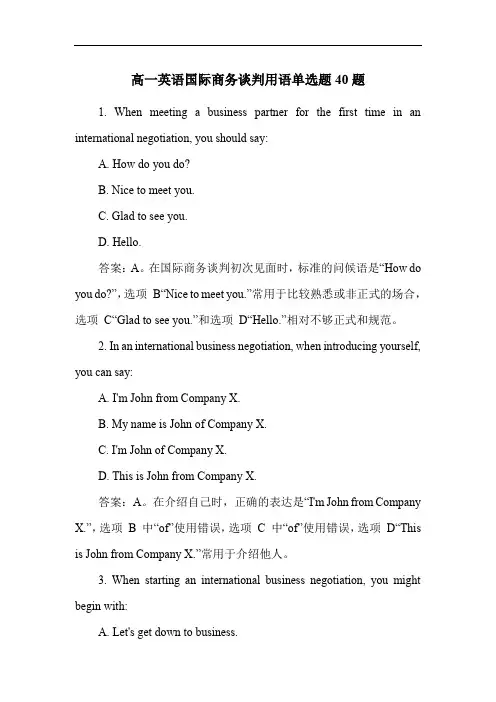
高一英语国际商务谈判用语单选题40题1. When meeting a business partner for the first time in an international negotiation, you should say:A. How do you do?B. Nice to meet you.C. Glad to see you.D. Hello.答案:A。
在国际商务谈判初次见面时,标准的问候语是“How do you do?”,选项B“Nice to meet you.”常用于比较熟悉或非正式的场合,选项C“Glad to see you.”和选项D“Hello.”相对不够正式和规范。
2. In an international business negotiation, when introducing yourself, you can say:A. I'm John from Company X.B. My name is John of Company X.C. I'm John of Company X.D. This is John from Company X.答案:A。
在介绍自己时,正确的表达是“I'm John from Company X.”,选项B 中“of”使用错误,选项C 中“of”使用错误,选项D“This is John from Company X.”常用于介绍他人。
3. When starting an international business negotiation, you might begin with:A. Let's get down to business.B. How can we work together?C. It's a pleasure to do business with you.D. I'm looking forward to a successful negotiation.答案:C。
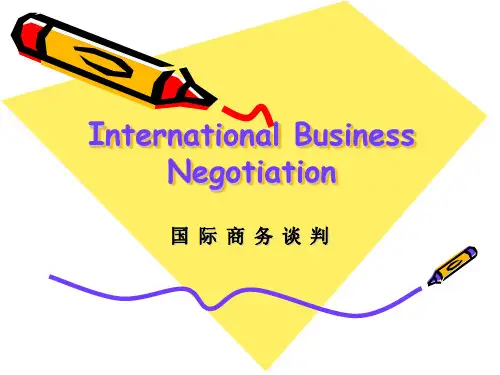
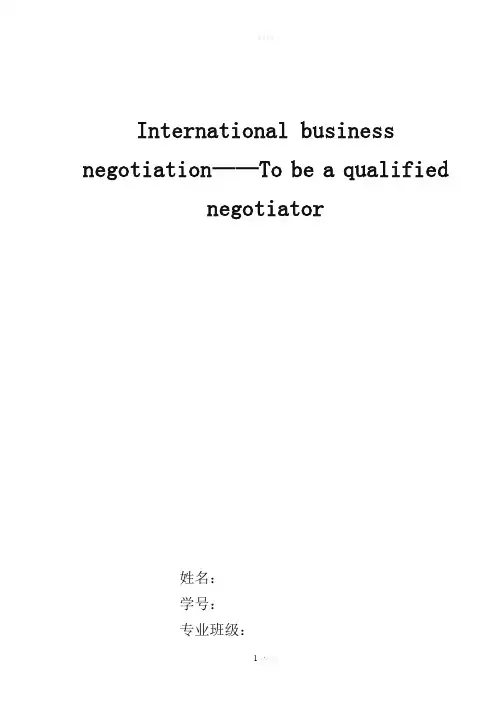
International business negotiation——To be a qualifiednegotiator姓名:学号:专业班级:To be a qualified negotiatorToday’s globalization requires professionals to deal with their counterparts in countries with different economic, cultural, legal, and political environments. You may need to resolve a dispute with a supplier, finalize a counter proposal for a state-owned enterprise, or lead a multicultural team. Thus in a globalized market, few subjects are as critical as negotiating across cultural boundaries. When negotiators are from diverse culturally sensitive negotiating skills are necessary for managing in an international setting. So, it needs we deal with carefully and keenly.As we know, if you want to be a good international negotiator you should prepare well before start the negotiation.The most important thing is to collect information. Such as: the background, corporate culture and management method of the target co. you will negotiate with. Because all these aspects will be closely related to their offer, their way of doing business, even the strategy they will adapt in a negotiation. In addition, know the people well who will attend in the negotiation by all possible means. Pay more attention to their negotiation style: task-oriented or people-oriented? Their ways of handling things, directly or indirectly? High-context or low-context? The philosophy they stickto, win-win one or the win –loss one? And if possible, know about their personalities which may affect the going of the deal to a certain extent.Apart from that, you should spare some efforts on your own part, this may include: set up your objectives clearly. Always keep what you want to achieve in mind, work out a strategy (according to their possible tactics), distribute the roles appropriately, when doing this; you should be clear about different people’s characteristics. Last one; be ready to cooperate with other members in a team. Different people may have different perspectives and views to different things and in a negotiation they play different roles and have certain emphasis. So be cooperative is rather critical for a successful negotiator.1. Target decisionPerhaps the most important part of pre-negotiation planning is determining, with some precision, the negotiation objective that need to be achieved. A buyer cannot go into a negotiation with vague objectives such as ‘to get the price down or “to do the best I can”. A buyer must go further than this and establish a negotiation objective for each agenda item that he intends to raise.2. Collecting informationThe first step you should do is that you must make sure which kind of information you need.Then, we can use the following way get some important information.(1)international organizations;(2)governments;(3)service organizations;(4)directories and newsletters;(5)on-line service;(6)local laws and regulations;(7)information on financial credit;(8)market survey.3. Staffing negotiation teamsGenerally speaking, a negotiation team consist of a team leader or chief negotiator, and an interpreter if it is a bilateral negotiation, and a note keeper. Other key members of the team include professionals and experts representing their special fields, such as production, sales promotion, technology, financial accounting, engineering, law and other areas concerned with a specific negotiation, counting, engineering, law and other areas concerned with a specific negotiation.4. Choice of negotiation venuesGenerally speaking, negotiation sites can be divided into three categories host venue, guest venue and third party’s venue. You can according the situation and then choose right place. A careful consideration and arrangement for the preparatory work cansave a lot of time and resources for negotiators.5. Communicate in negotiationMuch of what people communicate to one another is transmitted with nonverbal communication. Examples include facial expressions, body language, head movements, and tone of voice, to name just a few. Some nonverbal acts, called attending behaviors, are particularly important in connecting with another person during a coordinated interaction like negotiation; they let the other know that you are listening and prepare the other party to receive your message. We discuss three important attending behaviors: eye contact, body position, and encouraging.6.The Case study of Cultural Difference Of Nonverbal CommunicationAnother most important factor which affects the success of business negotiation is cross-cultural communication.The study of cross-cultural communication includes language communica tion and non-verbal communication.People usually pay attention to verbal communication in general during communication.They believe that language is the only way to transmit and compre hend information,while ignoring the importance of non-verbal communication.This paper attempts to introduce the basic ideas of non-verbal communication and apply relevant principles to account for some cross-culture business negotiation skills through case studies.This paper aims to make people understand the importance of non-verbal communication and the non-verbal language difference which is influenced by different social ba ckgrounds so as to avoid business negotiations failure.Then i want to share with you some case about culture different: Case1:The Culture Difference of Body LanguageAt an international airport in an Arab country,a Chinese engineer wanted to express his appreciation attitude while che cking the luggage.As he knew no Arabic,the only way for him was to shake hands with the officer.Both of the engineer’s hands were full—his left hand was holding a small traveler’s bag and his right hand a pi ece of luggage.For the sake of convenience,the engineer quic kly put the bag into his right hand and extended his left oneto the officerhe was expecting a hand shake with the officer.Something happened unexpectedly.The officer’s smiling face turned pale and the smile disappeared at once. Instead of a courteous handshake,he slapped that engineer’s extended hand and walked away.Analysis:Personal body movements and facial expressions c an convey information which sometimes can cooperate with the l anguage,and sometimes even can replace the language to conveyinformation.What is wrong with the Chinese engineer in the c ase above?The point is that:he extends his left hand the Ara b officer for a handshake.What that engineer do not know is t hat,in Arab culture,left hand is dirty,and it is regarded a s an insult if someone uses it for a handshake.It is true that a business person could not have a complet e knowledge of all other culture and customs.However,as a bu siness person,he should learn as much as possible.Actually, more and more Western business magazines and journals have bec ome more and more interested in study on cultural differences and teaching their business people how to behave accordingly i n another culture.People of different cultures will have different understan ding about body language.Business Communication is not only t he exchanges and cooperation in the economic field,but also t he exchange and communication between cultures,and cultural f actors always play a crucial role.The same movements or expre ssions in different cultures may stand for different meaning. For example,Americans use thumb and index finger to make a ci rcle instead"OK"as a symbolic gesture.But,in Japan,it is s tand for"coin",the shape of"money".So in Japan the gesture means the money.In France,in most cases,the gesture means"zero"or"no value".Use the same gesture on the same occasi on can means different kinds of meaning in different culture and cause different kinds of responses.The same gesture,the Americans means"OK";the Japanese means"money",they want to know something about the price;French means"no value".In a word,in the process of business communication businessmen sh ould know some cultural habits to avoid unnecessary misunderst anding.Case2:The Cultural Difference of ParalanguageSome Japanese businessmen went to the United States for a large trade negotiation.At the beginning of the negotiations, U.S.representatives spoke a lot.They want to reach an agree ment quickly.However,the Japanese representatives kept silent.When the U.S.representatives try to talk with the Japanes e,these American managers confused and felt frustrated.Becau se the American managers sometimes just got a"Hay"or a nod a s the answer,even sometimes they got nothing but the silence. Finally,the U.S.manager concluded:"The Japanese do not wan t to do business with us.They are so rude,they even do not ha ve a willing to talk with us!"This trade negotiation ended w ith failure.Analysis:More often the American-Japanese business communication runs into a loop:the more the American talks,the-mor e silent the Japanese will be-they need time to digest what th e American has just said;and the more silence the Japanese re spond with,the more the American will talk.For those America n managers,perhaps the saying“enough is enough”is the be st expression to describe their irritated feeling or frustrati on.This helps to explain why the American manager in the case above finally said:"The Japanese do not want to do business with us.They are so rude,they even do not have a willing to talk with us!"What makes the American-Japanese business communication r uns into such a loop is the cultural difference of the two cou ntries.They have different understanding of silence.American s believe an eloquent speaker is regarded as a good communicat or.For that reason,many Americans assume that one should be eloquent,and this should be the standard applicable everywher e in the world.However,what they do not know is that such a standard does not fit into the Japanese context.The Japanese culture,on the contrary,takes silence as an earnest way to t hink about what others have said(or are saying).Moreover,Ja panese distrust“speakers”.As the proverbhe who knows does not speak,and he who speaks does not know.That’s the reason why many Japanese often remain silent or pause for a long time before they say anything.As far as silence i s concerned,Japanese have all kinds of silence,each of which carries different meanings.And this is something many Americ an managers have little knowledge about.In a word,we must pay attention to the turn-taking skills during business conversation.In English-speaking countries, silence is the worst response during the communication.Becaus e they believe response is a expression of respect and attenti on.We must use non-verbal signals from time to time to mainta in a context with others during business communication.7. The necessary qualities a negotiator should have,such as:(1).Patience.(2).Self-control ability.(3).Listen carefully.Finally, we need to do a lot more to make us a successful negotiator, the above words are far less enough. But they can be seen as a guide and the direction for us. “Where there is a will, there is a way.” If only we set up our mind and spare no effects, nothing is impossible in the world, so does “be a successful negotiator come on!”【Reference】[1]Roy J. Lewicki & Bruce Barry & David M. Saunders. international business negotiation[2]Claude Cellich & Subhash C. Jain. Practical solutions to global business negotiations[3]白远.国际商务谈判欢迎您的下载,资料仅供参考!致力为企业和个人提供合同协议,策划案计划书,学习资料等等打造全网一站式需求。

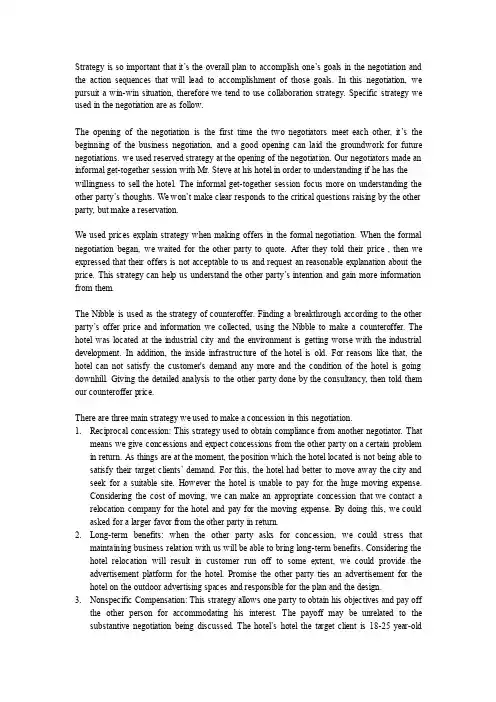
Strategy is so important that it’s the overall plan to accomplish one’s goals in the negotiation and the action sequences that will lead to accomplishment of those goals. In this negotiation, we pursuit a win-win situation, therefore we tend to use collaboration strategy. Specific strategy we used in the negotiation are as follow.The opening of the negotiation is the first time the two negotiators meet each other, it’s the beginning of the business negotiation, and a good opening can laid the groundwork for future negotiations. we used reserved strategy at the opening of the negotiation. Our negotiators made an informal get-together session with Mr. Steve at his hotel in order to understanding if he has the willingness to sell the hotel. The informal get-together session focus more on understanding the other party’s thoughts. We won’t make clear responds to the critical questions raising by the other party, but make a reservation.We used prices explain strategy when making offers in the formal negotiation. When the formal negotiation began, we waited for the other party to quote. After they told their price , then we expressed that their offers is not acceptable to us and request an reasonable explanation about the price. This strategy can help us understand the other party’s intention and gain more information from them.The Nibble is used as the strategy of counteroffer. Finding a breakthrough according to the other party’s offer price and information we collected, using the Nibble to make a counteroffer. The hotel was located at the industrial city and the environment is getting worse with the industrial development. In addition, the inside infrastructure of the hotel is old. For reasons like that, the hotel can not satisfy the customer's demand any more and the condition of the hotel is going downhill. Giving the detailed analysis to the other party done by the consultancy, then told them our counteroffer price.There are three main strategy we used to make a concession in this negotiation.1.Reciprocal concession: This strategy used to obtain compliance from another negotiator. Thatmeans we give concessions and expect concessions from the other party on a certain problem in return. As things are at the moment, the position which the hotel located is not being able to satisfy their target clients’ demand. For this, the hotel had better to move away the city and seek for a suitable site. However the hotel is unable to pay for the huge moving expense.Considering the cost of moving, we can make an appropriate concession that we contact a relocation company for the hotel and pay for the moving expense. By doing this, we could asked for a larger favor from the other party in return.2.Long-term benefits: when the other party asks for concession, we could stress thatmaintaining business relation with us will be able to bring long-term benefits. Considering the hotel relocation will result in customer run off to some extent, we could provide the advertisement platform for the hotel. Promise the other party ties an advertisement for the hotel on the outdoor advertising spaces and responsible for the plan and the design.3.Nonspecific Compensation: This strategy allows one party to obtain his objectives and pay offthe other person for accommodating his interest. The payoff may be unrelated to the substantive negotiation being discussed. The hotel’s hotel the target client is 18-25 year-oldyoung student whose paying capacity is low. We respect the spirit that the hotel founders always care of the s minority groups of the society. For this, our company would like to donate 20,000 dollars to aid by establishing a fund for hotelFour main options that we could used in this negotiation for responding to the other party’s offensive.1.Respond in kind: ask for some benefits from the other party before we make concession.When the other party insist on a certain problem and force us to make concession, we could relate this question with other questions together, for the condition to make concession If the other party requests us to raise the price, we could agree it only the when the hotel promise to move within a month. Our company could start our construction as soon as possible if the hotel moves in the in a short time.2.Adjournment: When there is an obstruction in the negotiation, using adjournment couldeffective. When the other party put forward a price that we could not accept it and they showing no willingness to make a concession, then we could call for an adjournment. That could make us analyze the situation objectively, and take the corresponding countermeasure.3.No precedent :that’s a strategy to reject the other party’s request. When the other party makean extortionate request, we could explain to them that our company had no this precedent in the past and it’s un fair to other clients. By using this strategy to protect our own interest.4.Power limitation: During the negotiation ,when the other party asked for price that is close to290,000, our negotiators could indicated that they have no right the decision-making , that have already outrun the power range that they have to ask for instruction from superior.。
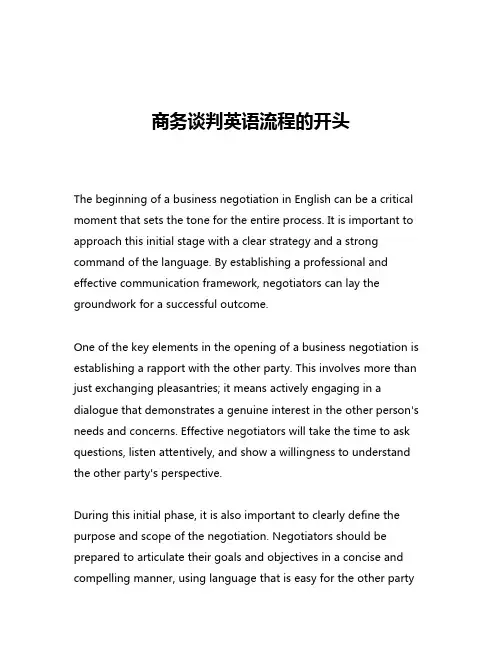
商务谈判英语流程的开头The beginning of a business negotiation in English can be a critical moment that sets the tone for the entire process. It is important to approach this initial stage with a clear strategy and a strong command of the language. By establishing a professional and effective communication framework, negotiators can lay the groundwork for a successful outcome.One of the key elements in the opening of a business negotiation is establishing a rapport with the other party. This involves more than just exchanging pleasantries; it means actively engaging in a dialogue that demonstrates a genuine interest in the other person's needs and concerns. Effective negotiators will take the time to ask questions, listen attentively, and show a willingness to understand the other party's perspective.During this initial phase, it is also important to clearly define the purpose and scope of the negotiation. Negotiators should be prepared to articulate their goals and objectives in a concise and compelling manner, using language that is easy for the other partyto understand. This may involve providing a brief overview of the key issues to be discussed, as well as any relevant background information that can help set the stage for a productive dialogue.Another crucial aspect of the opening stage is establishing a shared understanding of the negotiation process itself. Negotiators should be prepared to explain the steps and timeline involved, as well as any specific protocols or procedures that will be followed. This can help to manage expectations and ensure that all parties are on the same page from the outset.One effective strategy for the beginning of a business negotiation is to start with a "win-win" mindset. Rather than approaching the discussion as a zero-sum game, negotiators should seek to identify areas of common ground and explore opportunities for mutually beneficial outcomes. This can involve finding creative solutions that address the needs and concerns of both parties, rather than simply trying to outmaneuver the other side.Throughout the opening stage of the negotiation, it is important for negotiators to maintain a professional and composed demeanor. This means avoiding confrontational language or aggressive tactics, and instead focusing on building a collaborative and constructive dialogue. Effective negotiators will also be prepared to handle any unexpected challenges or objections that may arise, responding withcalm and measured responses that keep the discussion on track.One key aspect of the beginning of a business negotiation is the exchange of information. Negotiators should be prepared to provide relevant data, documents, or other materials that can help to support their position and strengthen their case. At the same time, they should be willing to ask for clarification or additional information from the other party, in order to gain a deeper understanding of their needs and priorities.As the negotiation progresses, it is important for negotiators to remain flexible and adaptable. They should be prepared to adjust their strategies and tactics as necessary, based on the evolving dynamics of the discussion. This may involve revisiting earlier agreements or exploring new options that were not initially considered.Throughout the process, effective communication and active listening will be critical. Negotiators should be attuned to the nonverbal cues and subtle nuances of the other party's responses, and be prepared to adjust their language and approach accordingly. They should also be willing to ask for clarification or feedback, in order to ensure that they are accurately interpreting the other party's intentions and concerns.Ultimately, the beginning of a business negotiation in English is a crucial phase that can set the tone for the entire process. By approaching this initial stage with a clear strategy, a strong command of the language, and a commitment to building a collaborative and constructive dialogue, negotiators can increase their chances of achieving a successful outcome. Whether they are engaging in a high-stakes deal or a routine contract negotiation, the ability to effectively navigate the opening stages of the process can be a key differentiator in the world of international business.。
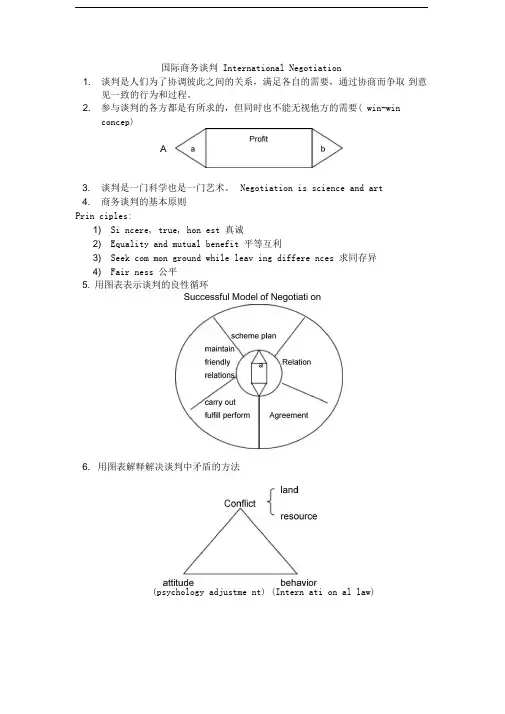
国际商务谈判 International Negotiation1. 谈判是人们为了协调彼此之间的关系,满足各自的需要,通过协商而争取到意见一致的行为和过程。
2. 参与谈判的各方都是有所求的,但同时也不能无视他方的需要( win-winconcep)3. 谈判是一门科学也是一门艺术。
Negotiation is science and art4. 商务谈判的基本原则Prin ciples:1) Si ncere, true, hon est 真诚2) Equality and mutual benefit 平等互利3) Seek com mon ground while leav ing differe nces 求同存异4) Fair ness 公平5. 用图表表示谈判的良性循环6. 用图表解释解决谈判中矛盾的方法(psychology adjustme nt) (Intern ati on al law)Successful Model of Negotiati onBargain 厂solved problemcon flictN=C=N Negotiati on7 •美国商人谈判风格1) History《The Declaration of Independence 独立宣言Immigra nt from Europe to America Open up AmericaThe spirit of develop ing AmericaCreati on2) America ns attach importa nee on Practice 实际Keep on e'promise and respect con tractsLawyers play a very important role in the negotiation. Not until they confirmeverythi ng in the con tract will they sig n it. After the agreeme nt, Americans keep it seriously.Take efficie ncy 讲求效率Before a n egotiati on, America ns will map out a pla n first, and the n carryit out step by step.与美国人谈判要尽量简明扼要,直接进入实质阶段,那些繁文缛节往往会使他们产生反感Pursue pragmatic achieveme nt and fond of ven tureThey press their goals, value efficiency and prefer to include all necessaryparts in the negotiation embracing designing, development, production,engineering, sale and price and reach a package deal3) Pers onal characteristicsSelf-c on fide ntAmerican s high individualism is manifested through their decision makingprocess -- in dividual has the right to make the decisi on. Pers onal resp onsibilityis stressed美国人个人表现欲很强,乐意扮演“硬汉”“英雄”的形象。
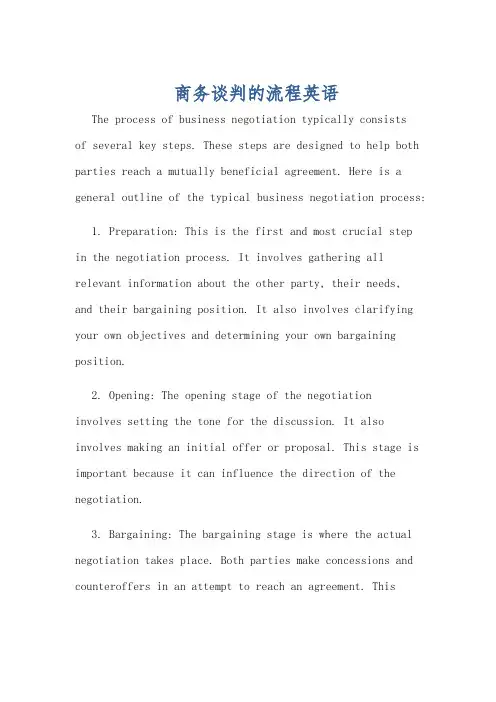
商务谈判的流程英语The process of business negotiation typically consistsof several key steps. These steps are designed to help both parties reach a mutually beneficial agreement. Here is a general outline of the typical business negotiation process:1. Preparation: This is the first and most crucial stepin the negotiation process. It involves gathering all relevant information about the other party, their needs,and their bargaining position. It also involves clarifying your own objectives and determining your own bargaining position.2. Opening: The opening stage of the negotiationinvolves setting the tone for the discussion. It also involves making an initial offer or proposal. This stage is important because it can influence the direction of the negotiation.3. Bargaining: The bargaining stage is where the actual negotiation takes place. Both parties make concessions and counteroffers in an attempt to reach an agreement. Thisstage can involve a lot of back-and-forth communication and can take some time to complete.4. Closing: The closing stage of the negotiationinvolves finalizing the details of the agreement. This may involve documenting the terms of the agreement andobtaining signatures from both parties.5. Implementation: Once an agreement has been reached,the next step is to implement it. This may involve taking specific actions to fulfill the terms of the agreement,such as making a payment or delivering a product or service.以上是商务谈判的一般流程。
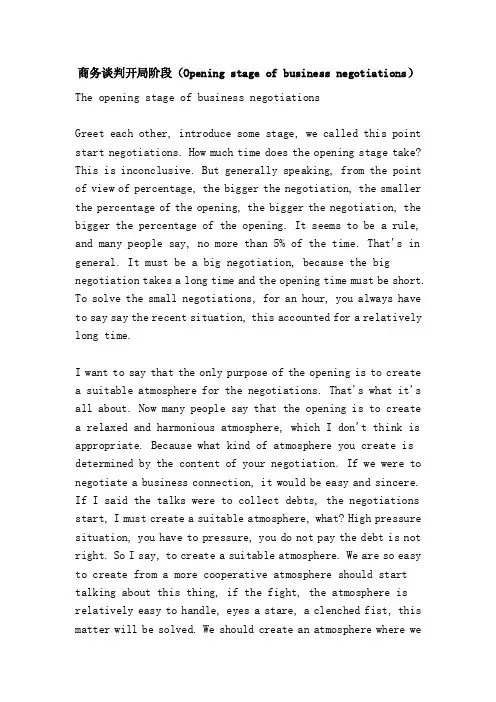
商务谈判开局阶段(Opening stage of business negotiations)The opening stage of business negotiationsGreet each other, introduce some stage, we called this point start negotiations. How much time does the opening stage take? This is inconclusive. But generally speaking, from the point of view of percentage, the bigger the negotiation, the smaller the percentage of the opening, the bigger the negotiation, the bigger the percentage of the opening. It seems to be a rule, and many people say, no more than 5% of the time. That's in general. It must be a big negotiation, because the big negotiation takes a long time and the opening time must be short. To solve the small negotiations, for an hour, you always have to say say the recent situation, this accounted for a relatively long time.I want to say that the only purpose of the opening is to createa suitable atmosphere for the negotiations. That's what it's all about. Now many people say that the opening is to create a relaxed and harmonious atmosphere, which I don't think is appropriate. Because what kind of atmosphere you create is determined by the content of your negotiation. If we were to negotiate a business connection, it would be easy and sincere. If I said the talks were to collect debts, the negotiations start, I must create a suitable atmosphere, what? High pressure situation, you have to pressure, you do not pay the debt is not right. So I say, to create a suitable atmosphere. We are so easy to create from a more cooperative atmosphere should start talking about this thing, if the fight, the atmosphere is relatively easy to handle, eyes a stare, a clenched fist, this matter will be solved. We should create an atmosphere where wecan communicate with each other and compromise with each other. What should we do? It is not for the claim, but for the sake of long-term business relationship. If it is not for the claim, not for fighting, but for a kind of sincere cooperation, we must create an atmosphere of mutual trust, a relaxed atmosphere, and a serious atmosphere. That is, we must create a suitable atmosphere for the development of business relations, everything from this point of view, it is easier. A lot of people ask me, this talks as if nothing to say. Relatively difficult. Sometimes it's awkward, what to say, and what to say. I think he still has.I want to share my experience with you here. A, if you know the past, each other can talk about their recent development, including your experience, meet you, how are you recently said, you say I do not like money recently, no hair, also often lose money, this is a statement. Do you like your first day to master, arrange your travel, so naturally this tour is a good topic, you pull me on the the Great Wall, I said your this majestic the Great Wall, after that I go to, when the hero of the feeling, you can talk about this, that is to say, this kind of tourism this kind of feeling, experience can talk past each other. For example, the first night they entertain you see to the Lao She Teahouse drink tea, this to Beijing, to see the point of opera. You talked to me second days ago. It was a good thing you arranged yesterday. I learned about the culture of Beijing Opera in your country and understood the culture and the meaning of drinking tea. These are all topics.I think this topic, you thank others, say cheap words, nor effort. This is a better thing.Moderator: first time.Huang Weiping: another way, a meeting, your body is good, like when the last time saw young people want to hear it, but this thing is fake, who see me say you are young now than last time, I hate not to criticize him, is it possible? I saw three years ago, I was still young now than the original, I live, but after all, many people are willing to listen to the words, you see you are looking really good, yes, you look at your pace than last time in which to see it easily, then the words really have nothing to say. I can still say the weather, and the innocence of Beijing is good. Maybe I'll say it right away, just because you came, yesterday was special, and today it suddenly became cool. That's the reason, for example, I came here on the first day, Beijing 35 degrees, I go here, that day, Beijing 22 degrees, a drop of 10 degrees. I think so, I'm sure I told you, this is the hospitality of the people of Shandong, so the temperature in Beijing is down.Besides, there are many topics that each other would like or have. That's a good topic. The Foreign Affairs Department of the University of our people's deputy director, the man of the world as a football match. I do not understand, he said there are Premier League, Serie A, there are west super, there are Bundesliga, many, and then said Serie A, there are AC, Milan and inter Milan, where there is this person, there is that person, I do not understand. You don't see a foreign professor coming. He said three, two,Two people talk about football, he also climbed along the pole,which people like the team, he likes which team. Finally, the relationship is very harmonious, so talking about cooperation is a very good starting point, football can talk about block, and cooperation will be talking about a piece of go. Yes, he does.You, for example, our relationship is introduced by the third, we will take third people to do the topic, that person asked you how to know, that person asked you how to know, friends of friends, must be friends. So the closer it gets, the closer it gets. It would be a good condition to cooperate with us in the past. I remember when we were at the Sino American Committee on Economic Education Exchange. It was fun. In 1989 July the meeting in Beijing, the atmosphere was very tense, our president, is the president of the University of our people, can be said to have a high ability of global control, etc. to dinner, the president said, we are in the 99% party effort. As soon as the relationship is relaxed, you have to say that this is because the cooperation is very pleasant, and China has made great efforts to bring the meeting up. The United States believes that this credit must be made in china. So you can always find a topic, but anyway, what I want to remind you of is that you must have been an impression of such an opening. Confident and trustworthy, friendly and based on good faith.I am not empty head eight brain, I am based on good faith. Confident and believable, this is more appropriate, more generous and comfortable, so it's easy to start doing things like that.Of course, here to pay attention to, your clothes, back to say, when the clothes meet for the first time, can not give peoplethe impression that we have dragged on, there is such a person, he never forget what occasions, wear a bunt, vest, pants, pants plus a panties. Sports pants, small vest, I told you, he dressed in this class, I say you how old this dress, he finally told me to say that we have no money to buy clothes, I say you have no money to buy clothes, buy clothes to home loans. Now more serious, and negative responsibility on the one hand, it is more like that. I think the start is for everyone's attention.After the opening, everyone sits down. What do you do at this time? At this point, when we are going to talk business, we are not talking about the offer at first. We must talk about the procedure of negotiation. The negotiation process should be said to be very important. From your angle, I've prepared some information for what? I have to have a plan at last. As I said last time, you have to make a simple plan. This simple scheme covers four aspects, that is, the goal, the procedure, the schedule and the members. What is the minimum purpose of negotiation? What should I talk about in the process, what to talk about later, how to progress, how to grasp the rhythm, and who will go with me, who am I going to talk to?. If the general plan, and simple scheme to these four aspects, then you sit down, start and end time to sit down and talk, the first thing is to determine the negotiation procedure.So tell everyone, in this process, my experience is to speak less and listen more. Why speak less and listen more? The reason is clear, the program itself means what to talk about first and what to talk about later. What problems should be solved first, and what problems can be solved?. In fact, what people wish to talk about first is purposeful in many cases. If I put thismatter very seriously, I will talk about this thing put in a very important position, if one thing is passing, I will put it in a position of little importance, so you listen carefully and the other put out of the program, you we can grasp each other why? What's the purpose of coming? That is what we say, goals, progress, this aspect of things you can get an understanding, and at the same time after understanding, they will come up with their own set of programs and countermeasures, so this matter should pay attention to. When I hear you, you always have to say something and say something. Note that, in general textbooks, always put these issues in accordance with the help of my party, is not conducive to be arranged for us, what to talk about first, after talking about what, in general, generally speaking, the hope is to help our things stand out in the middle of the program, is not conducive to our what to avoid in the program. In fact, I want to say, you know, people also understand, so in practice, you want to, so people want to do so, crash, how to do? You can arrange more in our program to our advantage and arrange less for us.I think of it this way, you are the buyer today, tomorrow is the seller, and everyone is equal. You're in the middle of the arrangement,To those who think that both sides can easily run out of the thing, not only is good for you, but also beneficial to each other, these things put out at the same time you analyze, the other to come up with the proposal, for example, is what I can give, what is he can make the step, then you take out these things, in the easy first of this program, all the other can give, and I want to get, put in here, I agree to concessions,the other party is willing to get, is also more than before the talk, this time, each will reach a mutual harmony, mutual trust is established and then go down, this thing is relatively easy.So I said at the start of finished, we talk about in the process of the program, not fight at outrance process, I will arrange you against, I say a program, you must take me down, from the beginning, you this negotiation means not smooth. Not like what I said, because I this is some experience of my own middle talks, I wanted to give up, you can give, I will get, you are willing to get things out, to talk about this, the most difficult thing to put it behind us do not talk, take a strategy called negotiation appreciation, our heads than clever, we give the heads of talk, this thing is solved.I am in the process of Sino US economic negotiations, to take such measures, with each other's secretary general, two of us are so general, morning report, report on the work of this year, a breakfast, breakfast has been smooth down, and at noon all the members and the president to go to dinner, I from the general secretary Nong Mou, how to divide the money memo. When the dinner was over, the chief reviewed the memo and we went to dinner. When we came back for dinner, we made a suggestion and we revised it. Finally, the day was fixed. I often say, is the spirit of the easy first principle, the most simple thing you agree, I agree that you want to be, I want to get this thing, we have to say, for example, this year a student volunteer to take as many books as we is 9 - 11, a student, well, you said 9, I said 10, this thing you are not happy, I am not happy, I finally run a bit, you say 9, I must tell you, this is the 13. Take the last plus one and make 11 copies. It's done. This endhe agreed that the title I actually at home ready to see that, this is the new frontier, which represents the dynamic you can buy, he said, because the time of this book, the price is set, and then copy down, this thing is solved. Who will the teacher send? Do you have a candidate? I say Robert, Nobel Laureate in economics, he gave me the email said to me here to teach, he said I did not notice, I said, now on the phone, a phone call came, it was decided. The simple things are settled, and the last is difficult. For example, how much should a scholar go abroad? It's rather difficult. I put my data put out, even what is the state's inflation rate, your living expenses, the state's content is what, how much is the tuition, I put all the data here, you should see is how much money? The last fight down, this thing is decided by the president of the two, we write the place an imaginary number, agreed to write a certain imaginary, that level is good, the last president to discuss. Said 10% increase, 10% came up, and 10% is 1800 dollars, is not a joke. This is in accordance with the "first easy", "difficult", each other trust, this matter will be easy to handle.So I'm not saying that the textbooks say no, but in practice, many things have a starting point, even when I talked about the win, said when the Israeli occupation of the territory of Egypt, I said a win-win, at camp David, the Americans are also easy to difficult, the first objective talk clearly, everyone wants peace, as long as the affirmation of this purpose, talk easy, the last territory is the most difficult, and then look at how to solve it, look down along. So from the program, I would like to ask you to pay attention here.First of all, you have to figure out what you want, what peoplewant, and secondly, you should find out what steps you can make and what steps people can make. This is one point. Second in this process, you must listen more and talk less, listen more to the less in the process, you can be very objective understanding of the fundamental purpose to the other party involved in the negotiations in what place, you only know the fundamental purpose of the other party, you can turn to find out what people want, it is better to solve the. So, from preparation, including material,Including data, create a suitable environment and atmosphere in the opening is mainly determined from the negotiation process of this point of view, the actual is figuring out what to say, after what, books of the favorable and unfavorable, much less, avoid, these are good, but I feel, easy to to finally solve problems similar to those of walnut type, more practical and effective in practice. That's all for today.。
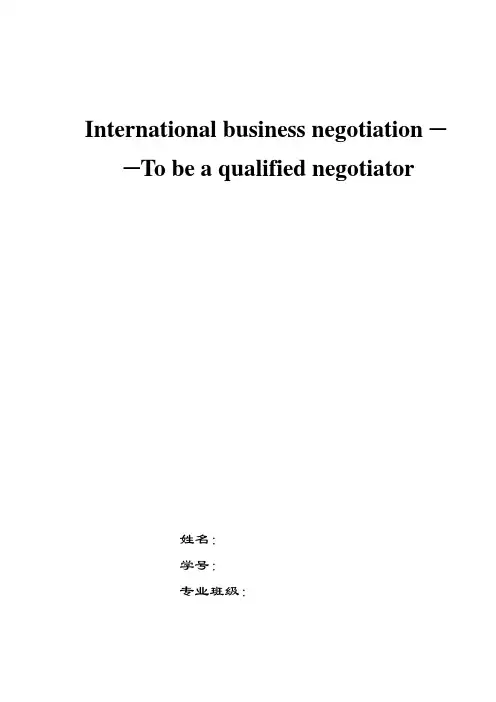
International business negotiation——To be a qualified negotiator姓名:学号:专业班级:To be a qualified negotiatorToday’s globalization requires professionals to deal with their counterparts in countries with different economic, cultural, legal, and political environments. You may need to resolve a dispute with a supplier, finalize a counter proposal for a state-owned enterprise, or lead a multicultural team. Thus in a globalized market, few subjects are as critical as negotiating across cultural boundaries. When negotiators are from diverse culturally sensitive negotiating skills are necessary for managing in an international setting. So, it needs we deal with carefully and keenly.As we know, if you want to be a good international negotiator you should prepare well before start the negotiation.The most important thing is to collect information. Such as: the background, corporate culture and management method of the target co. you will negotiate with. Because all these aspects will be closely related to their offer, their way of doing business, even the strategy they will adapt in a negotiation. In addition, know the people well who will attend in the negotiation by all possible means. Pay more attention to their negotiation style: task-oriented or people-oriented? Their ways of handling things, directly or indirectly? High-context or low-context? The philosophy they stick to, win-win one or the win–loss one? And if possible, know about their personalities which may affect the going of the deal to a certain extent.Apart from that, you should spare some efforts on your own part, this may include: set up your objectives clearly. Always keep what you want to achieve in mind, work out a strategy (according to their possible tactics), distribute the roles appropriately, when doing this; you should be clear about different people’s characteristics. Last one; be ready to cooperate with other members in a team. Different people may have different perspectives and views to different things and in a negotiation they play different roles and have certain emphasis. So be cooperative is rather critical for a successful negotiator.1. Target decisionPerhaps the most important part of pre-negotiation planning is determining, with some precision, the negotiation objective that need to be achieved. A buyer cannot go into a negotiation with vague objectives such as ‘to get the price down or “to do the best I can”. A buyer must go further than this and establish a negotiation objective for each agenda item that he intends to raise.2. Collecting informationThe first step you should do is that you must make sure whichkind of information you need.Then, we can use the following way get some important information.(1)international organizations;(2)governments;(3)service organizations;(4)directories and newsletters;(5)on-lineservice;(6)local laws and regulations;(7)information on financial credit;(8)market survey.3. Staffing negotiation teamsGenerally speaking, a negotiation team consist of a team leader or chief negotiator, and an interpreter if it is a bilateral negotiation, and a note keeper. Other key members of the team include professionals and experts representing their special fields, such as production, sales promotion, technology, financial accounting, engineering, law and other areas concerned with a specific negotiation, counting, engineering, law and other areas concerned with a specific negotiation.4. Choice of negotiation venuesGenerally speaking, negotiation sites can be divided into three categories host venue, guest venue and third party’s venue. You can according the situation and then choose right place. A careful consideration and arrangement for the preparatory work can save a lot of time and resources for negotiators.5. Communicate in negotiationMuch of what people communicate to one another is transmitted with nonverbal communication. Examples include facial expressions, body language, head movements, and tone of voice, to name just a few. Some nonverbal acts, called attending behaviors, are particularly important in connecting with another person during a coordinated interaction like negotiation; they let the other know that you are listening and prepare the other party to receive your message. We discuss three important attending behaviors: eye contact, body position, and encouraging.6.The Case study of Cultural Difference Of Nonverbal CommunicationAnother most important factor which affects the success of business negotiation is cross-cultural communication. The s tudy of cross-cultural communication includes language comm unication and non-verbal communication. People usually pay a ttention to verbal communication in general during communica tion. They believe that language is the only way to transmit a nd comprehend information, while ignoring the importance of non-verbal communication. This paper attempts to introduce t he basic ideas of non-verbal communication and apply relevan t principles to account for some cross-culture business negoti ation skills through case studies. This paper aims to make people understand the importance of non-verbal communication and the non-verbal language difference which is influenced by different social backgrounds so as to avoid business negotiat ions failure.Then i want to share with you some case about culture different:Case 1: The Culture Difference of Body LanguageAt an international airport in an Arab country, a Chinese engineer wanted to express his appreciation attitude while ch ecking the luggage. As he knew no Arabic, the only way for him was to shake hands with the officer.Both of the engineer’s hands were full—his left hand was holding a small traveler’s bag and his right hand a piece of luggage. For the sake of convenience, the engineer quickly put the bag into his right hand and extended his left one to the officerhe was expecting a hand shake with the offi cer.Something happened unexpectedly. The officer’s smiling face turned pale and the smile disappeared at once. Instead of a courteous handshake, he slapped that engineer’s extended hand and walked away.Analysis: Personal body movements and facial expressions can convey information which sometimes can cooperate withthe language, and sometimes even can replace the language to convey information. What is wrong with the Chinese engine er in the case above? The point is that: he extends his left h and the Arab officer for a handshake. What that engineer do not know is that, in Arab culture, left hand is dirty, and it is regarded as an insult if someone uses it for a handshake.It is true that a business person could not have a complet e knowledge of all other culture and customs. However, as a business person, he should learn as much as possible. Actuall y, more and more Western business magazines and journals h ave become more and more interested in study on cultural dif ferences and teaching their business people how to behave ac cordingly in another culture.People of different cultures will have different understandi ng about body language. Business Communication is not only the exchanges and cooperation in the economic field, but also the exchange and communication between cultures, and cultu ral factors always play a crucial role. The same movements o r expressions in different cultures may stand for different me aning. For example, Americans use thumb and index finger to make a circle instead "OK" as a symbolic gesture.But, in Jap an, it is stand for "coin", the shape of "money". So in Japan the gesture means the money. In France, in most cases, the g esture means "zero" or "no value" . Use the same gesture on the same occasion can means different kinds of meaning in different culture and cause different kinds of responses. The same gesture, the Americans means "OK"; the Japanese mean s "money", they want to know something about the price; Fre nch means "no value". In a word, in the process of business communication businessmen should know some cultural habits to avoid unnecessary misunderstanding.Case 2:The Cultural Difference of ParalanguageSome Japanese businessmen went to the United States f or a large trade negotiation.At the beginning of the negotiatio ns, U.S. representatives spoke a lot. They want to reach an a greement quickly. However, the Japanese representatives kept silent.When the U.S. representatives try to talk with the Japane se, these American managers confused and felt frustrated. Be cause the American managers sometimes just got a "Hay" or a nod as the answer, even sometimes they got nothing but th e silence. Finally, the U.S. manager concluded: "The Japanese do not want to do business with us.They are so rude, they e ven do not have a willing to talk with us !" This trade negotiation ended with failure.Analysis: More often the American-Japanese business co mmunication runs into a loop: the more the American talks,th e-more silent the Japanese will be-they need time to digest what the American has just said; and the more silence the Ja panese respond with, the more the American will talk. For th ose American managers, perhaps the saying “enough is eno ugh”is the best expression to describe their irritated feeling or frustration. This helps to explain why the American mana ger in the case above finally said :" The Japanese do not wa nt to do business with us. They are so rude, they even do no t have a willing to talk with us !"What makes the American-Japanese business communicat ion runs into such a loop is the cultural difference of the two countries. They have different understanding of silence. Ame ricans believe an eloquent speaker is regarded as a good co mmunicator. For that reason, many Americans assume that on e should be eloquent, and this should be the standard applica ble everywhere in the world. However, what they do not kno w is that such a standard does not fit into the Japanese conte xt. The Japanese culture, on the contrary, takes silence as an earnest way to think about what others have said (or are saying). Moreover, Japanese distrust “speakers”. As the proverb he who knows does not speak, and he who speaks does not know.That’s the reason why many Japanese often remain sile nt or pause for a long time before they say anything. As far as silence is concerned, Japanese have all kinds of silence, e ach of which carries different meanings. And this is somethin g many American managers have little knowledge about.In a word, we must pay attention to the turn-taking skills during business conversation. In English-speaking countries, silence is the worst response during the communication. Beca use they believe response is a expression of respect and atte ntion. We must use non-verbal signals from time to time to maintain a context with others during business communication.7. The necessary qualities a negotiator should have,such as:(1).Patience.(2).Self-control ability.(3).Listen carefully.Finally, we need to do a lot more to make us a successful negotiator, the above words are far less enough. But they can be seen as a guide and the direction for us. “Where there is a will, there is a way.”If only we set up our mind and spare no effects, nothing is impossible in the world, so does “be a successfulnegotiator come on!”【Reference】[1]Roy J. Lewicki & Bruce Barry & David M. Saunders. international business negotiation[2]Claude Cellich & Subhash C. Jain. Practical solutions to global business negotiations[3]白远.国际商务谈判。
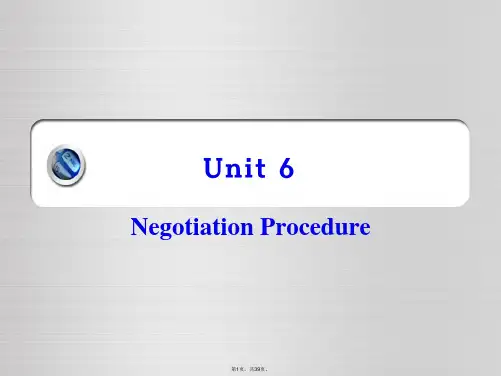
国际结算(International Settlement)、票据(Commercial Paper)、流通转让性(Negotiability)、过户转让(Assignment)、交付转让(Transfer)、流通转让(Negotiation)、汇票(Bill of Exchange)、本票(Promissory Note)、支票(Cheque)、限制性抬头(Restrictive Order)、指示性抬头(Demonstrative order)、来人抬头(Payable to Bearer)、出票条款(Drawn clause)、光票(Clean Bill)、跟单汇票(Documentary Bill)、记名背书(Special Endorsement)、空白背书(Endorsement in Blank)、限制背书(Restrictive Endorsement)、提示(Presentment)、承兑(Acceptance)、拒付(Dishonor)、追索(Recourse)、汇款(Remittance)、收款人(Payee)、赊账交易(Open Account Transaction)、预付货款(Payment in advance)、售定(Be sold out/up)、寄售(Consignment)、托收(Collection)、委托人(Consignor Principal)、托收行(Remitting Bank)、代收行(Collecting Bank)、付款交单(Documents against Payment,简称D/P)、承兑交单(Documents against Acceptance简称D/A)、信用证(Letter of Credit,简称L/C)、承付(Honour)、议付(Negotiation)、开证申请人(Applicant)、受益人(Beneficiary)、即期付款信用证(sight payment L/C)、延期付款信用证(Deferred Payment Credit)、公开议付信用证(Free Negotiable L/C)、保函(Letter-of Guarantee, L/G)、独立保函(Letter of Independent Guarantee)、从属保函(Letter of Accessory Guarantee)、备用信用证(stand-by L/C)、国际保理(International Factoring)、保理商(Factor)、到期保理(Maturity Factoring)、融资保理(Financed Factoring)、福费廷(Forfaiting)、选择期(Option Period)、承担期(Commitment Period)、多收期(Grace Days)、商业发票(Commercial Invoice)、海关发票(Customs Invoice)、形式发票(Proforma Invoice)、提单(Bill of Lading ,B/L)、物权凭证(Document of Title)、承运人(Carrier)、托运人(Shipper)、收货人(Consignee)、记名提单(Named consignee B/L)、不记名提单(open B/L)、指示提单(order B/L)、航空运单(Airway Bill, AWB)、承运货物收据(Cargo Receipt-C/R)、联合运输单据(Combined Transport Document -CTD)、保险单(Insurance Policy)。
Phases of Business Negotiation商务谈判的阶段Business negotiations are conducted in the following four phases:the preparation phase(准备阶段);the opening phase(开始阶段):1.proposal:exploration(试探), bidding(报价);2. reflectingthe bargaining phase(讨价还价阶段): bidding & bargainthe closing phase(结束阶段):settling(成交)and ratifying(批准)笼统一点分就是:Pre-negotiation (前期准备阶段)Face-to face negotiation (面对面谈判阶段) : the opening phase(开始阶段):1.proposal:exploration(试探), bidding(报价);2. reflectingthe bargaining phase(讨价还价阶段):bidding & bargainthe closing phase(结束阶段):settling(成交), ratifying(批准)Post-negotiation (谈判后期阶段):summary of the negotiation (谈判总结)评估谈判过程评估对手评估谈判对手评估谈判结果For word meaning and business value might differ. If there is some negative feedback, it might cause another round face-to-face negotiation. Therefore, the terms agreed on should be read to each after the concessions are exchanged. The discussions should be held by means of minutes of the meeting. Or something unpleasant or unexpected might happen in the later on course of implementation of the contract unless both sides paid enough attention to every detail. It’s best to confirm that both sides understand everything they have agreed on before they leave the table.Modules of Business Negotiation商务谈判的环节Enquiry & Reply (询价与答复)Offer & Counter-offer (报盘与还盘)Acceptance & Conclusion of a Contract (接受与签订合同).Note:For word meaning and business value might differ. If there is some negative feedback, it might cause another round face-to-face negotiation. Therefore, the terms agreed on should be read to each after the concessions are exchanged. The discussions should be held by means of minutes of the meeting. Or something unpleasant or unexpected might happen in the later on course of implementation of the contract unless both sides paid enough attention to every detail. It’s best to confirm that both sides understand everything they have agreed on before they leave the table.The Preparation Phase准备阶段The pre-negotiation stage starts from the first contact between the two sides whose interest in doing business with each other is shown. From this stage on, both sides begin to understand each other’s needs, declare values and evaluate the benefits of entering the process of this negotiation. This stage is usually more important than the formal negotiations in the international business relationship. Social and informal relationships between negotiators, trust and confidence in each other are of great help. Both sides also start to form their strategy for face-to-face negotiation as well as try to foresee and take precautions against possible events. To be fully prepared before negotiations, negotiators will have to take into consideration the following aspects:the negotiation team, gathering of information, and the negotiation brief.谈判的准备阶段从双方有意合作的第一次接触时就开始了。